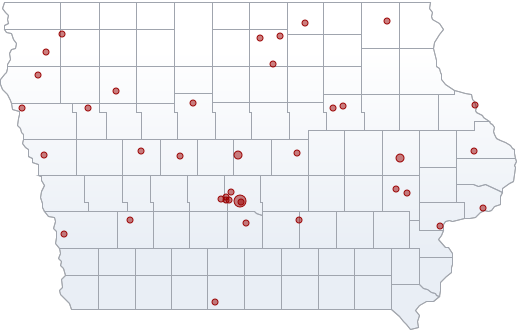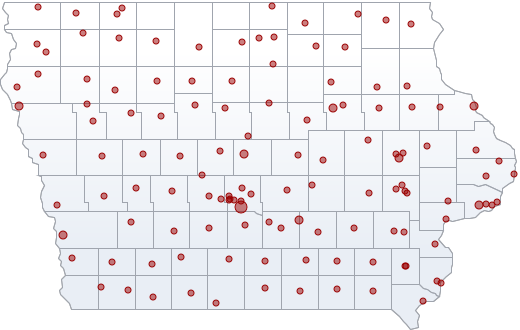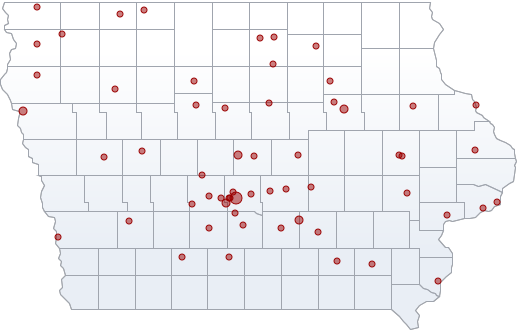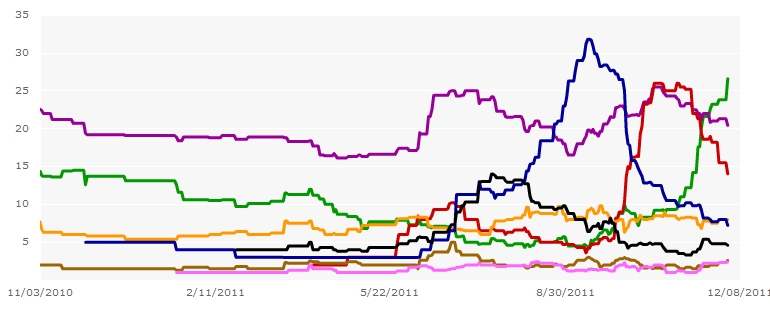By now most of the media outlets have picked up on the Des Moines Register poll that was released last night, but I want to address a couple of points that may have been missed in the extensive media coverage. First, it’s worth reminding everyone that polling a caucus state is much more difficult than for a regular primary because the polling outfit has to sample the population of likely caucus voters, which is quite small. Part of the reason the Des Moines poll garners so much attention is that it generally has a good track record in forecasting the caucus results. (The paper has been running this poll going back to the Reagan years, so they have some experience in polling Iowa caucuses). Nonetheless, there are lots of assumptions built into the forecast that leave room for error. And, there’s still a month and several Republican debates to go. Note that only 28% of those polled in Iowa say their mind is made up. A lot can happen to change the dynamics on the ground there.
With those caveats, I want to highlight a couple of interesting findings from the actual poll. As I noted in my last post, not only does Gingrich lead among likely caucus voters with 25%, he is the second choice of 18% of the survey respondents, which also leads the field. In terms of second choice candidates, Romney is second with 15%, and Perry third at 12%.
Gingrich also has the second fewest votes for “least liked”, with only 6% of respondents designating him as such. Santorum leads with only 4% choosing him as least liked. Romney and Bachmann, however, tie for the lead as least liked, with both getting 15%.
When asked which of the candidates whom they haven’t seen they would most like to see, Gingrich leads the field with 26% of respondents saying he’s the one they want to meet. That suggests that he has potential to win over more voters. Romney, in contrast, is grouped down with the rest of the field with 15% of respondents saying he’s the candidate they most want to meet.
When asked about various candidate qualities, Gingrich is the overwhelming choice as the most knowledgeable (58%), most experienced (58%) and most like Ronald Reagan (28%). No one else comes close in these categories. He also has a slim lead over Romney (22-20%) as most likely to turn the economy around. Finally, Gingrich finishes first as the candidate most likely to bring change, with 27%, followed by Paul at 18%.
However, it is not all bad news for Romney. He is viewed as the most “presidential” (34%) and “most electable” (38%). Gingrich is a respectable second in those categories.
On the whole, the internals of this poll are more favorable to Gingrich than even the top number showing Gingrich in the lead. And they raise a critical question for Romney: Is it even worth devoting resources to Iowa, thus raising media expectations that may be hard to meet? The answer, I think, may turn on whether Romney calculates that his superior resources will allow him to turn out the vote in numbers greater than suggested by this poll, and that Gingrich will be unable to translate his polling support into actual votes. Keep in mind that four years ago this calculation didn’t work in Romney’s favor, as Iowan conservatives coalesced behind Huckabee even though Romney spent scads of money in the state. In looking at the poll results, I can see this same dynamic unfolding in January, with many caucus participants opting for their second choice option. Note that this poll was in the field before Cain announced that he was suspending his campaign. The wildcard is Paul, but as I noted yesterday, while I’m sure he’s going to win his 15-18%, the polling results indicate that may be his ceiling; he’s the second choice of only 7% of likely caucus goers.
I’ve discussed in previous posts how Romney might change his strategy to take on Gingrich, so won’t belabor the point here. Interestingly, the Republican establishment continues to believe – or to hope – that Gingrich’s candidacy is flawed, and that he will implode, ceding the field to Romney. But if I’m Mitt, I would pay less attention to what the experts keep saying, and more to what the polls indicate is actually going to happen in Iowa.




